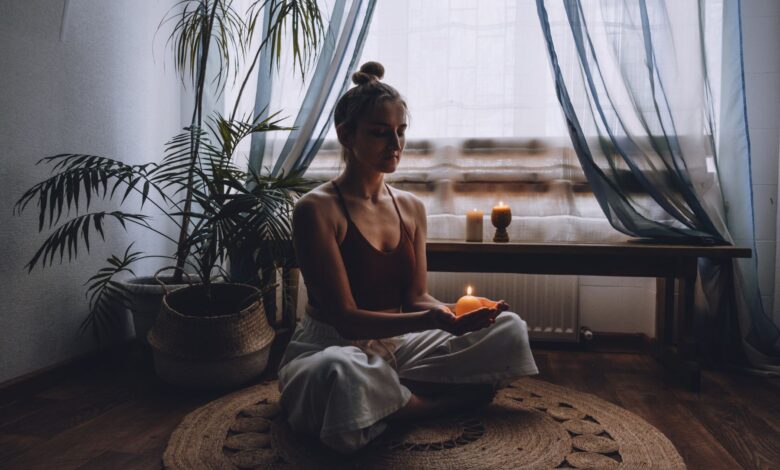The Ultimate Guide to Creating a Relaxing Self Care Routine at Home

In today’s fast-paced world, finding time to care for oneself can be a challenge, but it’s essential for maintaining overall well-being. A well-crafted self-care routine can significantly impact your physical and mental health, allowing you to handle life’s demands with more resilience and grace.
Why Self-Care is Important
Self-care is more than just a buzzword; it’s a critical aspect of maintaining mental and physical health. Prioritizing self-care can lead to a healthier and more fulfilling life.
Benefits of Self-Care
Engaging in regular self-care practices can reduce stress, improve mood, and enhance productivity. When you make self-care a habit, you prioritize your well-being, which enables you to bring your best self to all aspects of your life. Self-care is not a luxury but a necessary part of your routine.
The Science Behind Self-Care
Scientific studies have shown that self-care can have profound effects on the brain and body. Practices such as mindfulness and meditation release endorphins and reduce cortisol levels, promoting a sense of calm and well-being.
Setting Up Your Space
The environment you create for your self-care routine is crucial for maximizing relaxation and enjoyment. Creating a relaxing space can enhance your overall experience and help you cultivate a sense of calm.
Choosing the Right Location
Finding a quiet, comfortable space in your home is the first step in creating a relaxing self-care routine. Whether it’s a cozy corner of your living room or a dedicated room, the space should feel inviting and free from distractions.
Creating a Soothing Atmosphere
A soothing atmosphere can be achieved through the use of calming colors, soft lighting, and pleasant scents. Consider using candles, essential oils, or a diffuser to enhance the ambiance of your space. The right environment can bring you joy and relaxation.
Essential Tools and Supplies
Having the right tools and supplies on hand can make your self-care routine more effective and enjoyable. Items such as soft blankets, yoga mats, and your favorite books or magazines can add to the comfort and relaxation of your routine.
Daily Self-Care Practices
Incorporating daily self-care practices can help you maintain a sense of balance and well-being. Integrating self-care into your daily routine ensures that you consistently take care of your physical and mental health.
Morning Rituals
Starting your day with a few mindful practices can set a positive tone for the hours ahead. Consider activities like stretching, meditation, or enjoying a quiet cup of tea to begin your day calmly and centered.
Midday Breaks
Taking short breaks throughout the day can help reduce stress and increase productivity. Simple practices like deep breathing exercises, a quick walk, or listening to calming music can provide a refreshing pause.
Evening Wind-Down
Ending your day with a relaxing routine can promote better sleep and overall relaxation. Consider activities such as reading, journaling, or a warm bath to help you unwind and prepare for a restful night’s sleep.
Weekly Self-Care Practices
Dedicating time each week to more extensive self-care activities can enhance your routine and provide deeper relaxation. These practices can be more elaborate and time-consuming but offer significant benefits.
Pampering Sessions
Weekly pampering sessions, such as facials or long baths, can rejuvenate your body and mind. Treating yourself to a home spa experience can be a luxurious way to unwind and recharge.
Physical Activities
Engaging in regular physical activities, like yoga or walking, can boost your mood and energy levels. Exercise not only improves physical health but also releases endorphins, which help reduce stress and increase happiness. Engaging in activities that bring you joy is essential for overall well-being.
Creative Outlets
Finding time for creative activities can be a great way to express yourself and relieve stress. Whether it’s painting, writing, or crafting, creative pursuits can provide a satisfying and therapeutic outlet.
Monthly Self-Care Practices
Monthly self-care practices can serve as special treats that you look forward to and plan ahead. These activities can be more indulgent and provide a sense of anticipation and reward.
Spa Days at Home
Creating a spa-like experience at home once a month can be a luxurious way to unwind. Plan a day for yourself with a long soak in the tub, a face mask, and your favorite relaxing activities.
Goal Setting and Reflection
Taking time to set goals and reflect on your progress can help you stay focused and motivated. Monthly reflection sessions can help you assess your achievements and set new intentions for the coming weeks.
Exploring New Hobbies
Trying out new hobbies or activities can keep your self-care routine fresh and exciting. Experimenting with new interests can stimulate your mind and provide a break from routine.
Incorporating Technology into Your Self-Care Routine
Technology can be a valuable tool in enhancing your self-care routine when used mindfully. Various apps and devices can support your self-care practices and keep you motivated.
Meditation and Relaxation Apps
There are many apps available that can guide you through meditation and relaxation exercises. Apps like Headspace, Calm, and Insight Timer offer guided sessions that can help you relax and focus.
Fitness and Wellness Trackers
Using fitness and wellness trackers can help you monitor your progress and stay motivated. Devices like Fitbit or Apple Watch can track your activity levels, sleep patterns, and overall health.
Virtual Communities and Support
Joining virtual communities can provide support and inspiration for maintaining your self-care routine. Online groups and forums can offer encouragement, tips, and a sense of connection with others who share similar goals.
Overcoming Common Self-Care Challenges
Despite the benefits, many people face challenges when trying to establish a consistent self-care routine. Identifying and addressing these obstacles can help you maintain your self-care practices.
Time Management
Finding time for self-care can be difficult, but effective time management strategies can help. Prioritize your self-care activities by scheduling them into your daily routine, just as you would any other important task.
Motivation and Consistency
Staying motivated and consistent with your self-care routine can be challenging, but setting realistic goals can make a big difference. Start with small, achievable goals and gradually build up to more extensive practices.
Self-Care Without Guilt
It’s important to practice self-care without feeling guilty, as it is essential for your well-being. Remind yourself that taking care of yourself enables you to be more present and effective in other areas of your life.
Conclusion: Embracing Self-Care as a Lifestyle
Incorporating self-care into your daily life can lead to long-lasting improvements in your physical and mental health. By creating a personalized self-care routine and committing to it, you can enjoy a more balanced, relaxed, and fulfilling life.
FAQ Section
*How often should I practice self-care?*
It’s ideal to incorporate self-care practices daily, with additional activities on a weekly and monthly basis. Consistency is key to reaping the full benefits of self-care.
*What if I don’t have much time for self-care?*
Even short, 5-10 minute self-care activities can be beneficial and are better than neglecting self-care entirely. Simple practices like deep breathing, stretching, or a quick walk can make a difference.
*Can self-care be expensive?*
Self-care doesn’t have to be expensive; many effective practices are low-cost or free, such as meditation, walking, and journaling. Focus on activities that bring you joy and relaxation without breaking the bank.
—
This revised guide provides a comprehensive approach to creating a relaxing self-care routine at home, ensuring you can find peace and rejuvenation in your own space. Embrace these practices to enhance your well-being and enjoy a more balanced life.
Sources:
- Harvard Health – This source provides an in-depth look at the importance of self-care and offers practical tips for maintaining both physical and mental health.
- Mayo Clinic – Mayo Clinic’s article on self-care discusses various activities and practices that can improve overall well-being.
- National Institute of Mental Health – This source offers valuable insights into how self-care practices can positively impact mental health.
- American Psychological Association – APA provides a comprehensive guide on self-care, including the science behind it and practical advice for incorporating it into your daily routine.
- World Health Organization – WHO discusses the broader implications of self-care and its importance in promoting health and well-being globally.




